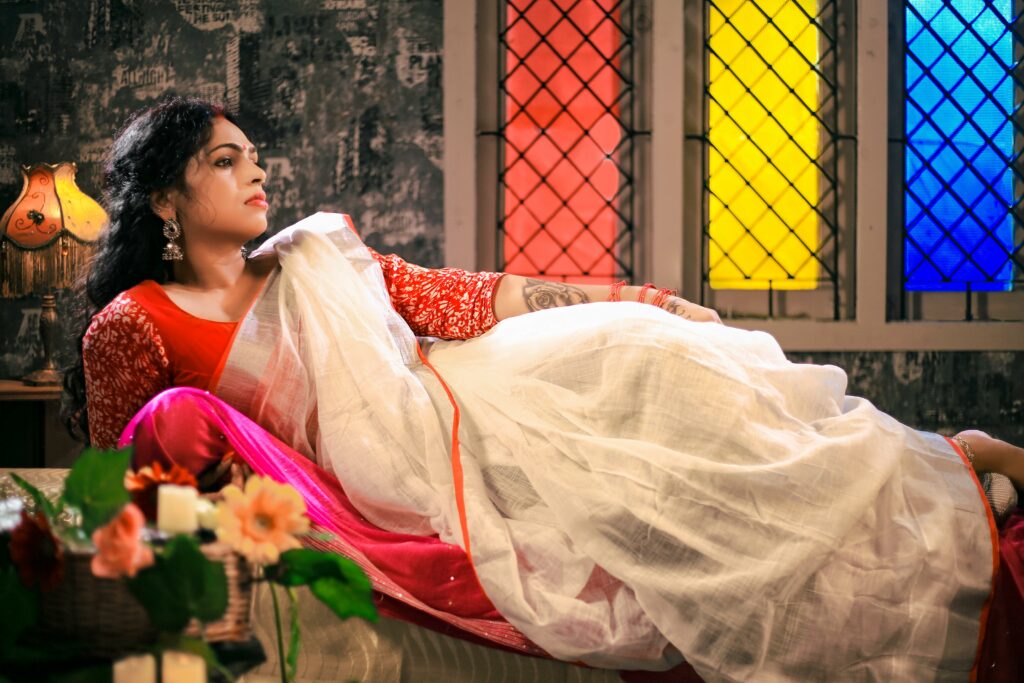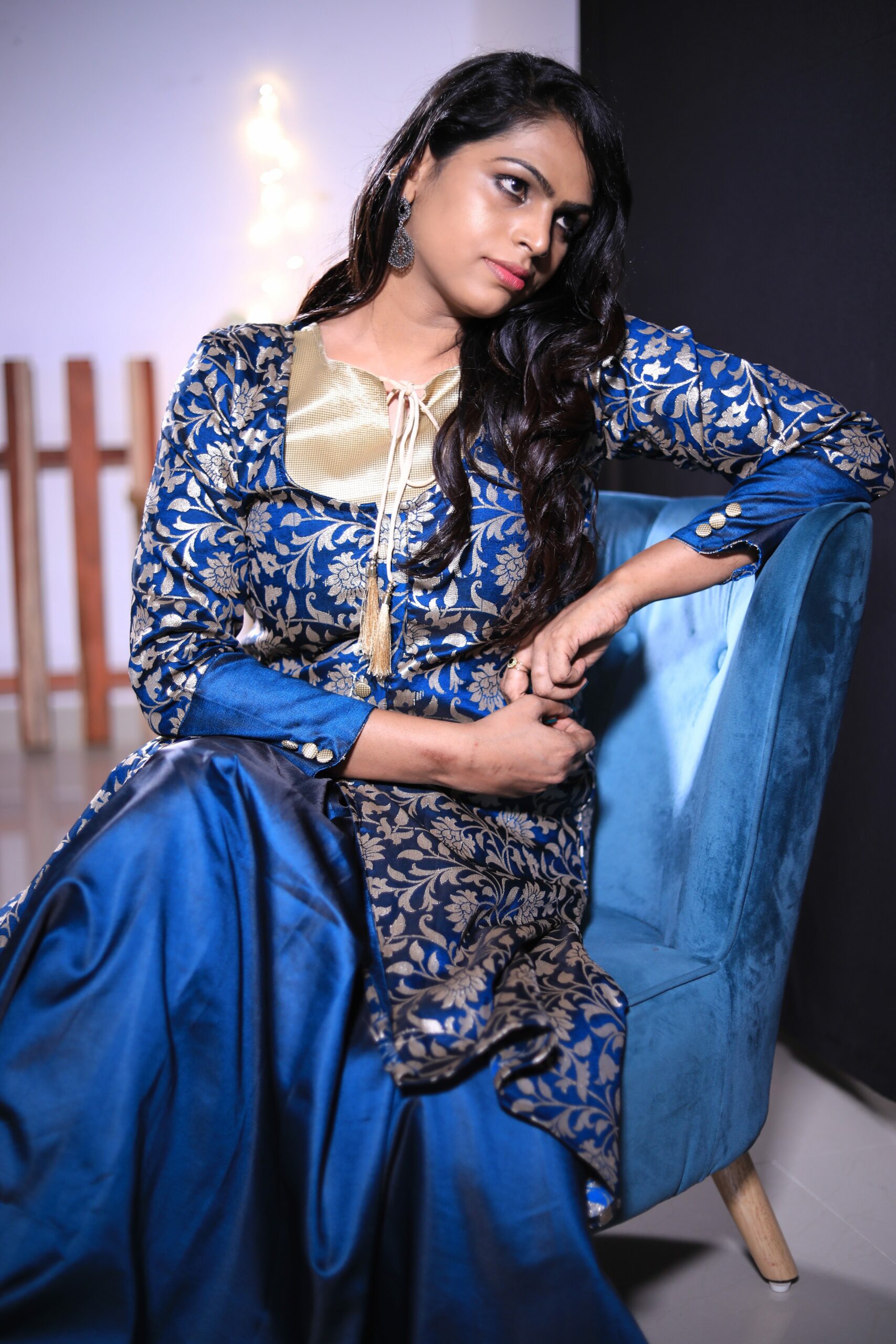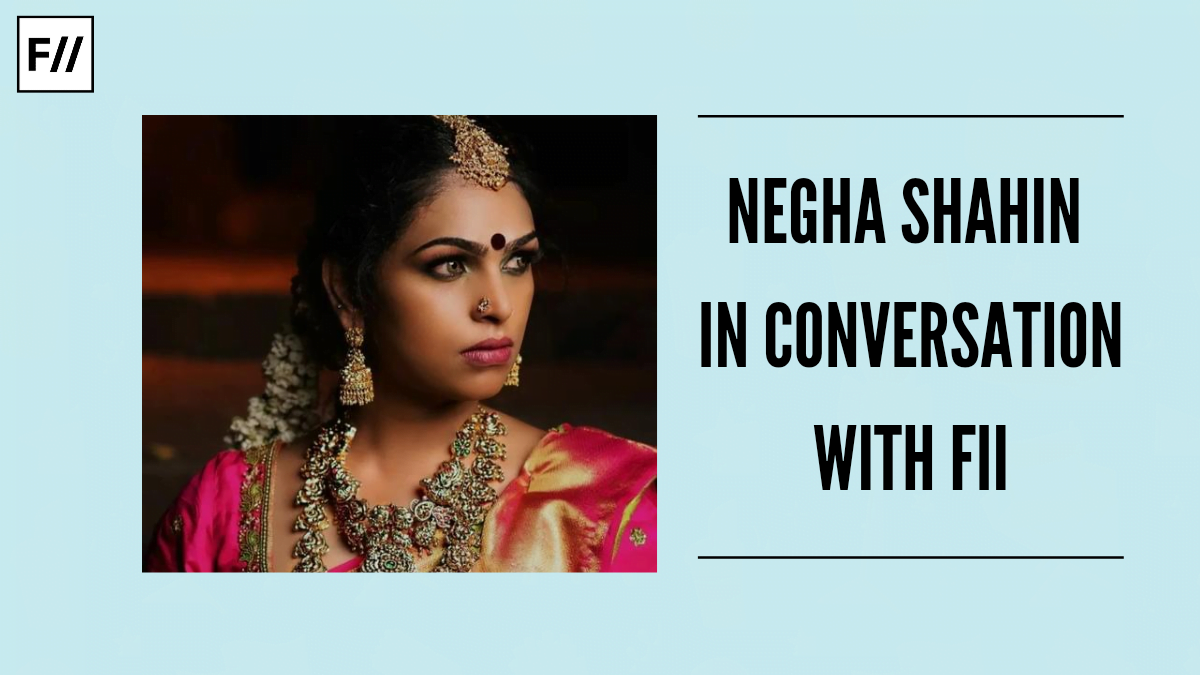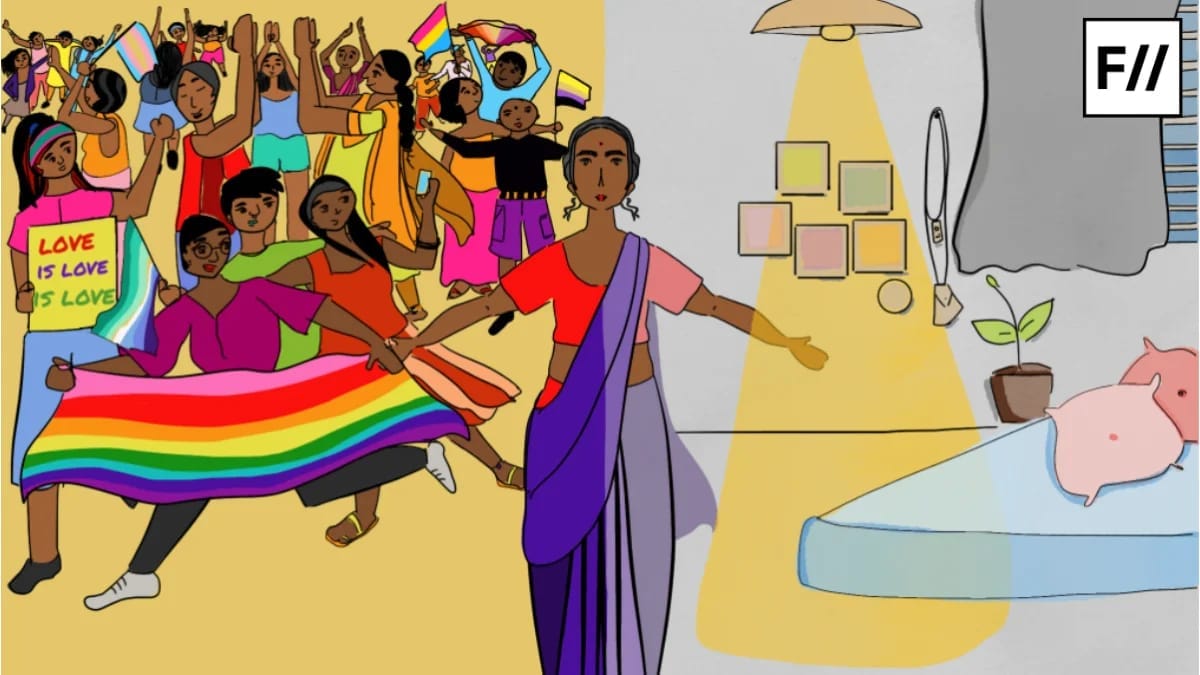Hailing from Tamil Nadu, the new talent in the Malayalam film industry, with immense clarity in
her thoughts and words, Negha Shahin is constantly fighting against the odds to achieve her dreams and has recently proved herself in the film world.
“Failures are okay. Insults are okay. You are allowed to have a bad day also. But take your time so we can fight another day. Also, we need to make sure about our mental health; we need to take care of us mentally and heal all our traumas.”
Negha Shahin
“There are people constantly fighting in society, like activists, feminists, trans feminists; they have to be responsible for their own safety along with other things. I have seen many activists who fight for others but forget about their own mental health. So, taking care of your mental health is very important,” says Negha to FII.
In this Interview, Negha Shahin, who carved her name in the South Indian film industry speaks about her
inspiring journey- of life, career and dreams.
Q: Around 6 months before, exactly on May 27, 2022, Kerala Government announced the State Film awards, and there was a name read aloud, making the trans community and the film industry very proud, winning the special award for transgender for the movie ‘Antharam’. How special was that moment for you?
A: Firstly, I did not know that I have come this far, belonging to a middle-class family in a village where even a bus won’t come, so I always used to have a thought like I am constantly surviving and I am not living because my parents did not accept me, I could not complete my education and I had to run away with my life from my place to a city like Chennai with just a thousand rupees and school certificates. I had to find a job to survive the next month and as I was only 18 at that time, everything has been a struggle for me since then. Never in my dreams I thought that I would end up being an artist, because there is a notion that the film industry belongs to people who are fair.
I used to watch them in awe on television. So, I had to overcome all those insecurities to accept to do a lead role in the film because I have only heard negative comments about a trans person acting in a movie all my life but my director Abhijith gave me confidence and the trust to break the insecurities I had and I ended up doing the film. The film got a wide recognition and it’s happening in India for the first time. Oh my God! That was my biggest milestone and I felt so happy that the universe chose me for this and to be a pillar of hope to prove for the upcoming trans-artists to break the stereotypes and make sure our dreams are valid.
Also read: TransVision: Breaking Stereotypes And Myths Around The Transgender Communities
Q: Before the film ‘Antharam’, you have acted in short films such as Piravi, Manam and Thirugangai in Tamil Industry. How did you start your journey as ‘Anjali’ in ‘Antharam’?
A: In the Tamil Industry, basically the opportunities were very low, even now I cannot sustain myself as an artist. There are lots of stereotypes in Indian cinema in general. Nowadays people are telling me that trans women should be fair, or should take treatments, but I wanted to be natural. I want to show my presence the way I am and I am very clear about that. On Instagram I use filters, but in cinema it cannot happen and I saw the audience liking the way I presented myself.

Recently I did a short film called ‘Neha’ in Behindwoods. People appreciated me for my natural acting and face without the make-up look. Amid all the struggles, I got short films or web series opportunities like these to act in small roles, within a one- or two-year gap. During this time Abhijith chettan (brother) from Kerala called me and told me about ‘Antharam’ and I did not believe it and was hesitant initially and asked him to choose someone else from Kerala. But he was very keen about this role for me, as he believed I was apt to do it. I took my time to think about it as I was scared about many things. Firstly, the thought of how am I going to act in an opposite role with a cis man; though I had confidence in my acting. I was really bothered about the negative comments that might come. Abhijith chettan saw my reels and Tik-Tok videos through social media and that is how he contacted me and I took that decision bravely.
Q: Adding to the previous question, born in Tamil Nadu, working there, then coming to the Malayalam industry, proving yourself here as well, finally achieving the state award and making everyone proud. How was it working with the team of ‘Antharam’?
A: It was really nice, since the time I left my family and hometown I was living all alone and living with my trans friends and I was embarrassed about going to any family functions or any events like that. Like I got adapted being an introvert in society because people did not include me in their function and I did not want to be embarrassed but when I became a part of the ‘Antharam’ crew, it was like a family.
They gave me my space, the privacy that I need, throughout the shoot. Those 30 days during the shoot at Calicut were the golden days in my life. I learned many Malayalam words taught by them and many other things as well. I was feeling very safe and secure and it was so heart-breaking while I returned to Chennai. Also, I felt a judgemental free space with people interacting very well, which made me feel comfortable and as a result I was able to be myself there.
Q: You acted as a Malayali woman who can also speak Tamil; did that help to get into the character and while dubbing?
A: I already told the director that I can’t speak Malayalam, but if you teach me, I can speak. Chettan told me that the story was about a girl who speaks Malayalam with a Tamil accent. Director Abhijith is a photographer; he has taken many pictures of the LGBTQA+ community; and he has researched about it a lot. Trans people can speak in different languages like Malayalam, Hindi, Tamil, Gujarati because of their harsh childhood and running away from home makes them learn many languages as they adapt to different places, irrespective of the state or language.

Even in Kerala, I have heard stories about trans people running away from home to cities like Delhi and Mumbai. In Tamil Nadu, people ran away to Mumbai with the fear of getting beaten by stones, in the early 90s. I think, keeping these in mind, he chose a Tamil-speaking Kerala girl as the lead role. And it seriously worked out for me. I would have been happy if they chose a Malayalam speaking artist as well for the role at that time, when he explained the role to me.
Q: As an artist, what were the challenges you faced? And how far do you think the industry has come forward in terms of inclusivity?
A: Yeah, still the Indian cinema is not inclusive for plus-sized women, brown skin women, so in this scenario considering a trans person or a queer person is definitely a great change! Universally, it is happening, we have seen a woman from South Africa win the Miss Universe title, so it’s happening globally. But here, even a dark-skinned female actor is still not normalised, LGBTQ+ subjects, female oriented subjects or breaking the stereotypes; everything is happening here and there subtly, still I feel like it has not happened to a good extent.
Also read: Claiming Spaces On Campus: Reflections Of A Transgender Student
So that should be changed; there is a hesitation to hire a queer person even now. Once a director told me to not present myself awkwardly, but what is there to be awkward about? It’s my skin tone, it’s my presence; this is how I live in society, that is what you should portray through the camera. Portraying character of a trans person through a cis person is more awkward. It is like you are stealing the opportunity of a trans person, that is okay for you, but casting a trans person is difficult for Indian cinema!
In the context of such things happening, coming to this industry with a dusky skin, from a village, unable to speak English fluently and a shy person- they can easily reject me, I have got rejected even without an explanation. I used to wonder why they reject me after praising my acting skills and after giving so much of hope, then I noticed the other person- they have casted someone who has a fairer skin tone. I have experienced this so much in my life!
“I worked in an NGO as a mental health counselor, that’s when I came to know more about mental health awareness and the unhealed traumas of the queer people, and it has also helped me to heal my own traumas with the things I faced when I came out in my past. My father used to abuse me and I was asked to die. I was not ready to die for nothing in this society. This NGO helped me to overcome my past, and I wanted to help other kids suffering through mental health issues to heal their traumas.“
Negha Shahin
All these made me feel like quitting my passion and struggles, I started looking for other job opportunities and worked somewhere else, placing acting as a secondary job. Without breaking these stereotypes, none of the artists like me can get into the industry. As part of my struggle, I have faced insults, and rejection mostly, like they will cast me only as a sex worker. Of course, it is also a work, but casting only as a sex worker does not do true justification to the trans-community, right? I kept doing the small roles, taking whatever chances came my way.
Q: There were many films, irrespective of the industry, which had misrepresentation of the queer community, where cis gender actors portrayed trans characters etc. and now we can see few positive changes in the industry when it comes to movies, for example in the film Gargi, we saw queer representation and appreciative initiative by government like adding third gender column in all forms, Tamil Nadu government has published a glossary of terms to address LGBTQA+ community of Tamil terminology etc are happening, what all are differences and positive changes that you specifically want to see in the upcoming years?
A: Forget about all these baby steps, I am telling this to all the states and India in general, forget about the baby steps for LGBTQA+. People are dying to survive here and with that context, there is no point in just taking baby steps, they should check on the lifestyle of the community, check if they are having a safe and enabling environment to live, I feel that is lagging here. I live in this community, still there is a suicide, there is a murder, there are abuses, sometimes when we are in a crowd, we do not feel safe around. Just like how the people in South Africa were suppressed and tortured back in the time, here, queer people are going through the same plight, but nobody is bothered about it. I face cat-calling or people stare at me when I go to public places like a mall; all these affect my mental health.

These kinds of transphobic and queerphobic attitudes should be changed. But it is not happening. I am happy that there is an initiative to bring it to the classrooms; finally, these kinds of baby steps are bringing a change in the year 2022. But people are still struggling. We truly believe that a safe environment is mushrooming for future trans kids. But the people living now are in a constant fight for things like a rental house, for a social document, for their pronouns. I don’t want to be indifferent; I am a normal human being just like everyone else.
“I am requesting all women out there, next time I want to hear; “End violence against women, children and transgenders”. Transwomen are women too; some ‘feminists’ don’t understand that. I used to tell them that I am a trans feminist, even if you are not accepting, I identify myself as a woman and I fight for women, transwomen, even transmen, because biologically before transition they were subjected to suppression and nobody is talking about it.“
Negha Shahin
When I think about a safer space to breathe, I don’t think I have it; that is the problem. Also, we want reservations! We have been talking about it for a long time. There have been steps like giving restrooms, but we are asking for a judgment-free society to use that washroom without any discrimination. Is there a law for that? We need job opportunities; we need reservations for that, at least in some percentage. To my knowledge, 6 trans people have been fighting to become a Police officer for the last 5 years. But they had to fight for age relaxation, for physical relaxation; they did not get the job yet. They are still fighting for it, constantly asking why their dreams are not valid. I desire bigger steps than baby steps for the betterment.
Q: I read about you working as a lead with Trans Rights Now Collective in an organisation called Dalit Bahujan Adivasi collective of Trans leaders across the country, also you worked in an NGO and as a host for Vikatan; what are your new ventures and dreams you are looking forward to?
A: I am the National Co-ordinator of the Trans Rights Now Collective at the Dalit Bahujan Adivasi Trans Collective. We mainly focus on people who are living in rural areas and people who are facing oppression in all ways. Caste-based oppression is still a thing. Even in the LGBTQA+ community, there are discriminations on the basis of classism and casteism. Usually, we say Dalit women are more vulnerable than upper-caste women, it’s the same here.
Also read: Transgender People Can Join NCC: Hina Haneefa’s Landmark Victory
We mainly work for the DBA community. And yeah, I worked in an NGO as a mental health counselor, that’s when I came to know more about mental health awareness and the unhealed traumas of the queer people, and it has also helped me to heal my own traumas with the things I faced when I came out in my past. My father used to abuse me and I was asked to die. I was not ready to die for nothing in this society. This NGO helped me to overcome my past, and I wanted to help other kids suffering through mental health issues to heal their traumas. Yes, I also worked as a host or VJ for many YouTube channels, in Vikatan Group of Publications. I was a host for a program called ‘Udaithu Pesuvom’. I interviewed a grave man, fire survivor woman, a cancer survivor, and also many celebrities. I left that job recently.
Talking about my new ventures, this year has been my best year. I won the state award as an actress and recently on Transgender Day of Remembrance, I wrote and directed a theater play and it’s completely with trans people from the community on the crew. When we speak for ourselves, we can talk about our issues better, so we found a team for the same called ‘Sandakaranga’- It means we people (Transmen, transwomen, non-binary and intersex people) are going to fight for our freedom through art, which was very successful. Another notable achievement was that I was one among the panelists for the UN Women conference event. It was during this time I learned about the trans-feminism movement. Because there are many ‘feminists’ who do not accept us as women, which is a violence.
I am requesting all women out there, next time I want to hear; “End violence against women, children and transgenders”. Transwomen are women too; some ‘feminists’ don’t understand that. I used to tell them that I am a trans feminist, even if you are not accepting, I identify myself as a woman and I fight for women, transwomen, even transmen, because biologically before transition they were subjected to suppression and nobody is talking about it. We were talking about all of these at the event.
Also read: Kinnar Ka Ki – The Story Of Four Transwomen, Their Journeys And Vision
There is a movement called ‘TERF’- Trans-exclusive radical feminism movement, and we used to tell that we are trans feminists. In India, this word is not that familiar. I introduce myself as a trans feminist on all platforms; now I can proudly tell that I am a trans feminist.
Q: Your success story is like a voice for many dreamers, for everyone in the community fighting against the odds, an inspiration to the upcoming generation. So, what do you have to tell anyone who is struggling to reach their dream, constantly fighting for their rights?
A: Failures are okay. Insults are okay. You are allowed to have a bad day also. But take your time so we can fight another day. Also, we need to make sure about our mental health; we need to take care of us mentally and heal all our traumas. There are people constantly fighting in society, like activists, feminists, trans-feminists; they have to be responsible for their own safety along with other things. I have seen many activists who fight for others but forget about their own mental health. So, taking care of your mental health is very important. Just like that we can have these bad days, failures, insults, discrimination, stereotypes, in life, but one should also grow the capacity, or the ability to fight against all of these.
The interview was carried out in Tamil and has been translated and paraphrased at the interviewer’s discretion.
FII thanks Negha for her time. You can follow her on Instagram.





What she said is tue and commendable.
We need bigger steps by government to make us on par with other genders.